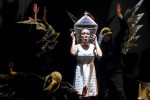The apocalypse looms in North Campus as a comet hurls towards Macgowan Hall. At night, a young girl’s imagination transforms the hall into a fantasy world.
These two universes are the settings for “Paper Cranes” and “Inconclusion,” the fictional plays that graduate acting, directing and playwright students have created and immersed themselves in for several months. This weekend, audiences will become part of these alternative realities at “An Evening of Devised Work,” the second annual showcase, which consists of these two plays.
The students who actualized these plays are part of the First Year MFA Interdisciplinary Program, which includes playwriting, acting and directing graduate students. Theater assistant professor Marike Splint divided the students into two groups and tasked them with devising their own play. For these plays, she said that found text, stories or music could be entry points of inspiration.
Daniel Stevens, a graduate acting student and an actor in the “Inconclusion” ensemble, said many of the graduate students were inexperienced with the devising process. Splint said she had her students study companies from the theater world that practice this technique in order to expose her students to possible methods they could use to create an original idea.
“What frustrated me, but what was also the most exciting part of this process, is (a classmate) looks at you and says, ‘Okay, what do you want to talk about?’ That’s it,” Stevens said.
When it came time to answer that question and create a structure for their play, Stevens said his group cycled through different topics. In the end, he said the ensemble used the question of how far one will go to avoid saying goodbye as their springboard for the story of “Inconclusion.”
Splint said the premise of “Inconclusion” is there are 45 minutes left on earth, and a group of friends convene in a basement in order to pass the time together.
“(‘Inconclusion’) is a play that is very kaleidoscopic,” Splint said. “We break out of the reality of the situation to really look into the characters’ minds to see how they deal with the situation and what moments of the life they cherished and what they are saying goodbye to.”
The other play, “Paper Cranes,” explores how a child would deal with being put in an adult situation prematurely by focusing on a child bride, said graduate directing student Angela Lopez.
Lopez, who is the director of “Paper Cranes,” said the idea for the play originated from her mother’s story. At age nine, her mother was sold to an abusive family due to her own family’s financial circumstances.
Splint said both plays draw on the idea that people use art as an escape when they are dealing with difficult situations. In “Paper Cranes,” the child bride copes with her harsh reality by creating a fantasy world in her mind. The characters in “Inconclusion” use memories as their form of escaping from the nearing end.
“An Evening of Devised Work,” Splint said, reflects the new direction of the master of fine arts department within the School of Theater, Film and Television. By offering the First Year Interdisciplinary MFA Program, the department encourages playwriting, acting, and directing students to work together in ensembles and collaborate on projects. She said that many of the theater companies producing good works are ensembles, and therefore, the department wants to expose its students to that training.
“A lot of the belief behind this program is that one single talent and skill set is becoming irrelevant in today’s society,” said Lea Madda, an graduate acting student. “Artists that are entering the theatrical world are now multitalented.”
Madda said the interdisciplinary approach has helped her approach her craft with a more open mind since she has been exposed to playwriting, directing and devising.
Stevens said the program allows students to meet other graduate students from different disciplines sooner. He said because of this play, he now knows that he wants to work with some of his cohorts on other projects.
“You learn about each other. You learn what resources the other person serves for you own goals, and how you can serve other people’s works,” Splint said. “I think it’s the ideal way to get to know other artists.”
